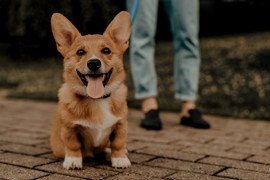Brandon Forder
 Why dogs eat their feces is a concern frequently brought up among my clients. And while this is a delicate and sensitive topic, it is an important one that needs to be addressed.
Why dogs eat their feces is a concern frequently brought up among my clients. And while this is a delicate and sensitive topic, it is an important one that needs to be addressed.
The act of eating feces is called coprophagia, and is surprisingly common amongst many mammals, not just dogs. Rabbits, beavers, rodents, elephants, and even some primates exhibit behaviours conducive to coprophagia. Regardless, no dog owner wants to have a dog that eats their own poop, so the big question is how do we curb this nasty behaviour?
There are several theories as to why dogs eat their own poop, however many scientists believe dogs eat feces in an effort to extract nutrients that may have left the body. Most poop-eating pups prefer fresh poop, whether their own or from a litter box, indicating that they’re looking for something that hasn’t yet begun to dry out or degrade.
This popular theory is backed up by the fact that most poop-eating dogs are fed highly processed commercial diets, and may not receive sufficient amounts of digestive enzymes. Dogs can synthesize certain enzymes on their own, but this isn’t always enough. Adding a digestive enzyme supplement to their diet will satisfy a dog’s needs, and may help curb coprophagia for good.
Certain medical conditions may also manifest in poop-eating behaviours. For example, exocrine pancreatic insufficiency (EPI) is a genetic condition that compromises the pancreas’s ability to create digestive enzymes. Additionally, certain medications like steroids, and medical issues like thyroid disease and diabetes may cause increased appetite in dogs, ultimately leading to compulsive poop eating.
Intestinal parasites may also play a significant role in coprophagia. Parasites need to eat, and they rob the body of nutrients. This leaves the host animal with less nutrition as the parasite continues to feed and grow. Dogs may consume their own feces as a means of obtaining much needed nutrients and enzymes.
While many of the reasons listed above boil down to lack of essential enzymes in the body, there are many behavioural reasons causing coprophagia. For instance, female dogs with puppies will often consume feces as a means of keeping the nest clean. This is an instinctual maternal behaviour that will often pass once her puppies reach a certain age.
Speaking of puppies, they are curious little creatures. As they explore their surroundings they tend to eat many things, including their own feces. This experiential behaviour usually phases out on its own as the puppy matures.
Stress is also a major cause of coprophagia. As in all mammals, stress and anxiety can wreak havoc on bodily functions. When a dog is subjected to heightened levels of stress, he may involuntarily defecate and ultimately consume his own waste in the process. By reducing their stress levels, you can reduce the poop-eating compulsions.
Providing there are no underlying health issues, here is my fool-proof way of eliminating coprophagia in dogs:
Feed a High Quality Diet
Since most commercial dog foods are overly processed, raw diets offer the highest levels of naturally occurring enzymes. Whether it’s frozen raw or dehydrated raw, it is wise to rotate among different formulas to get a healthy variety of proteins.
Supplement When Needed
For dogs on commercial diets (aka kibble), a high quality enzyme supplement will go a long way towards ensuring they receive sufficient enzymes to effectively process their meals. Look for high quality sources of digestive enzymes, prebiotics, probiotics, and antioxidants. Sprouted seed supplements are an ideal choice as they are among the most nutritionally dense foods on the planet.
Stay Active
Bored and under-stimulated dogs are likely to develop behavioural problems including coprophagia, among other things. By receiving consistent, regular exercise out of the home, and a variety of mentally enriching activities inside the home, you can ensure your dog’s physical and mental needs are met.
Stay Clean
Out of sight, out of mind! If a dog does not have access to poop, he cannot eat it. Keep your yard clean and you remove the temptation. It is also wise to supervise your dog in the yard and on walks so you can quickly remove feces.
There you have it! While the root cause of why most dogs eat their own poop is due to diet and/or behaviour, there are many things you can do to easily curb coprophagia for good.
Brandon Forder, known as The Pet Expert, is vice-president of Canadian Pet Connection, an industry leader in healthy pet lifestyles. Brandon holds multiple certifications in pet nutrition, and has more than twenty-five years’ experience specializing in pet health and behaviour. He has written hundreds of informative pet-related articles for newspapers, magazines, radio, and the popular Ask the Pet Expert Blog. Brandon is highly skilled in pet problem solving, and enjoys teaching others about smart and responsible pet ownership. To learn more, visit www.CanadianPetConnection.ca.












